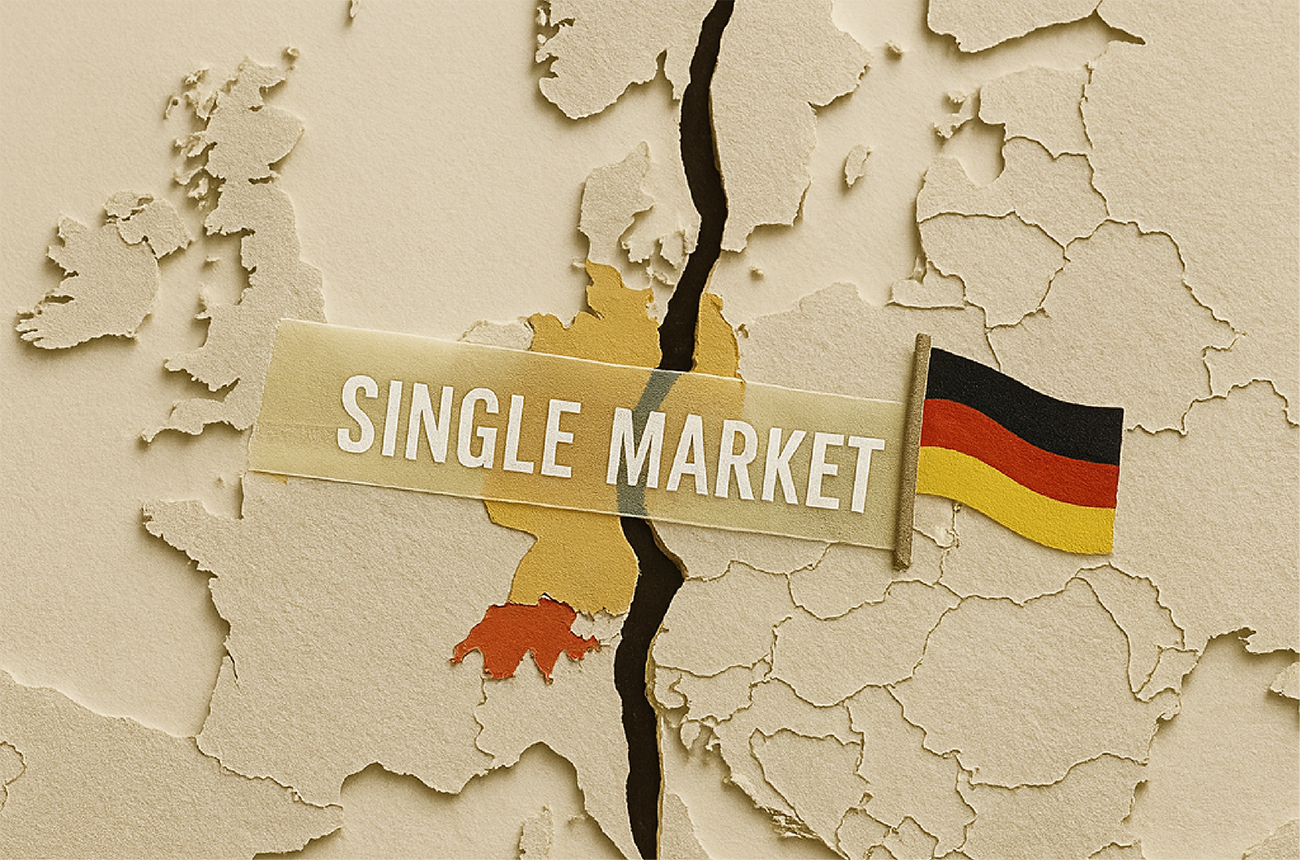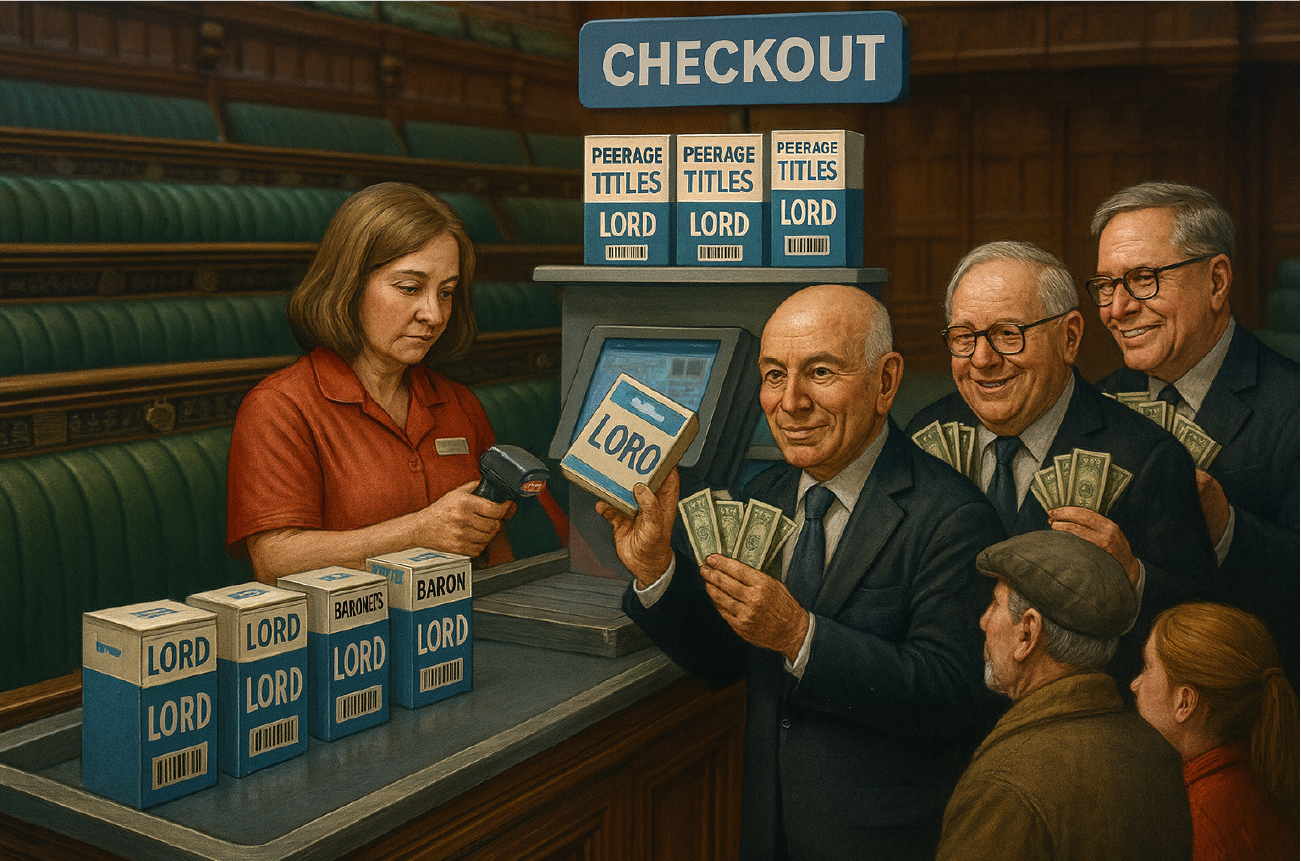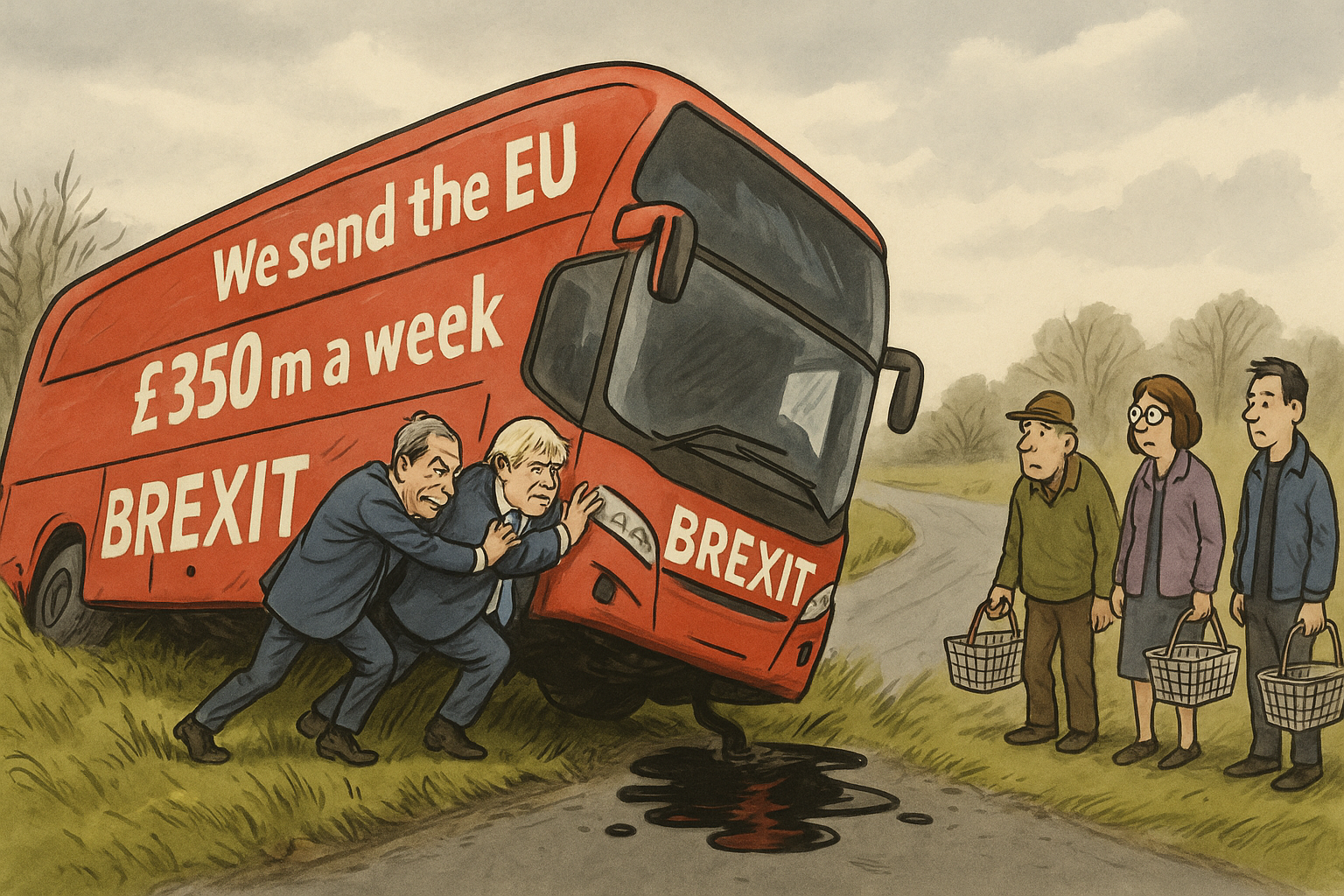Stay in the loop!
Summary
Germany’s firewall against the far right is cracking. Alternative für Deutschland (AfD)has moved from protest politics to real power in parts of the country, topping the vote in Thuringia in 2024 and finishing strongly elsewhere, while dragging national debate toward ethnonationalism and conspiracy-tinged culture war.Business leaders warn the party is toxic for investment and labour supply, the domestic intelligence service has formally designated it an extremist threat(pending court review of how that label is referenced), and its manifesto reads like a 2016-time capsule of anti-Muslim panic dressed up as “common sense.”Meanwhile, Elon Musk and Donald Trump’s orbit have thrown the AfD an approving nod from abroad, earning backlash in Germany and adding oxygen to a movement that promises “order” while delivering isolation, economic self-harm, and minority scapegoating. Germany’s choice is stark: pluralism with reform, or a backward lurch toward völkisch politics that would fracture Europe and leave the country poorer, older, and angrier. The Guardian Reuters Reuters
The New Respectable Extremism
TheAfD has normalised what once sat far outside polite discourse. A decade ago it barely scraped into parliaments; by September 2024 it won inThuringia with roughly a third of the vote, Germany’s first far-right regional victory since World War II, and ran the governing parties perilously close inSaxony. This wasn’t a fluke; it crowned years of polling momentum as inflation, budget crises, and migration anxieties piled up. The taboo is broken. The Guardian
AfD rhetoric, deportations, border walls, and ethno-cultural “restoration”, now echoes in mainstream debates. Conservative figures have toyed with procedural cooperation on migration votes, shifting the Overton window in AfD’s direction even when they swear they’ll never coalition with it. That flirtation alone has consequences: the line between conservatism and hard-right nativism blurs on TV panels while the state’s own watchdog moves the other way, deepening legal scrutiny of AfD networks. Reuters+1

Anti-Immigrant Fury vs EconomicReality
AfD’s core story is simple: Fortress Germany. Mass deportations, an end to “mass migration,” and rolling back the jus soli reforms that made children born in Germany to non-German parents eligible for citizenship. That doctrine is explicit in party platforms and public statements(“Islam does not belong to Germany,” bans on minarets and the call to prayer, the hostility to dual nationality). It’s not dog-whistles; it’s the foghorn. Alternative für Deutschland ReutersFrance 24
There’s one problem: arithmetic. Germany is old and getting older. Employers can’t fill hundreds of thousands of roles; the Bundesbank and economists keep repeating the obvious, Germany needs more immigration to sustain growth, pensions, and its industrial base. Boardrooms know it; so do unions and mayors. Reuters+1
The market has already voted. In 2024–25, coalitions of major German firms (BMW,BASF, Siemens, Deutsche Bank, Ford Germany and many more) publicly rallied under banners like Wir stehen für Werte / “We stand for values” and “Made in Germany – Made by Vielfalt,” warning that extremism and xenophobia repel the very talent and investment the country needs. This wasn’t“woke capitalism”; it was the export machine doing risk management. Ford Media Center Al Jazeera Euractiv
And the data undercuts AfD’s scare-line that refugees “drain” Germany. Longitudinal studies (IAB-BAMF-SOEP) show refugee employment rises steadily with years of residence, about half employed by year five, ~57–63% by years six–seven, ~68%by year eight, despite language and credential hurdles. That’s not a burden; it’s a pipeline, if you invest in integration. IAB-Forum+1InfoMigrants
Translation: AfD’s wall-building would blow a hole in Germany’s workforce, shrink GDP, and torch the country’s claim to be a high-value industrial hub. But it would keep the comment section patriots happy. Priorities.
The Party of Contradictions (and“Bird-Poop” History)
AfD leaders insist they’re not extremists, merely patriotic realists. Reality keeps disagreeing.
- On history: Thuringia boss Björn Höcke demanded a “180-degree turn” in remembrance culture and called the Berlin Holocaust Memorial a “monument of shame.” Another AfD leader, Alexander Gauland, waved away Nazi rule as a “speck of bird poop” on a glorious millennium. This is not accidental rhetoric; it’s revisionism with a tie on. The Guardian CBS News
- On Islam and citizenship: The manifesto line “Islam does not belong to Germany” sits alongside calls to ban minarets and roll back birth right citizenship and dual nationality. You can’t “equal-rights” your way around that with PR photos. Reuters Alternative für Deutschland The Washington Post
- On extremism: Germany’s domestic intelligence service (BfV) has now classified the AfD as extremist, enabling expanded monitoring, even as a court instructed the agency to pause publicly using the “confirmed extremist” label pending an injunction ruling. In Brussels, even the European Parliament’s far-right ID group expelled AfD’s delegation in 2024 after its lead candidate equivocated about the Waffen-SS. When Marine Le Pen thinks you’ve gone too far, you’ve gone too far. Reuters
- On “law and order”: From illicit finance probes to cosying up to neo-Nazi milieus at rallies, AfD’s ethics pitch keeps tripping over its own shoelaces. The party sues to stop surveillance even as its public record hands the BfV fresh exhibits. Reuters
Decoding the AfD Program: A 2016Manifesto for a 2025 Crisis
If you want the unvarnished AfD worldview, read the program they hammered in during 2016–2017 and have never really disavowed:
- Religion as threat: “Islam is not compatible with the constitution,” with policy asks to ban minarets/calls to prayer and to strip Muslim associations of public-law status. The Council of Europe warned even then that this posture collided with Europe’s bedrock values. Germany’s Basic Law protects freedom of religion. AfD’s text targets a faith, not illegal acts. ReutersAl Jazeera State Department
- Citizenship by blood, not belonging: Roll back jus soli so children born in Germany to non-German parents don’t automatically get citizenship; narrow dual nationality; raise barriers to naturalisation so citizenship becomes the last step after “proving” Germanness. That creates a permanent underclass and revives a 20th-century obsession with bloodlines. Alternative für DeutschlandThe Washington Post
- EU wrecking ball: If Brussels won’t bend, threaten Dexit and even dissolution of the union; if the euro won’t reform to suit, walk. That’s not “sovereignty,” it’s self-sanction for an export economy wired into the single market. Even mainstream conservatives warn this would “massively damage” jobs and industry. Alternative für Deutschland
- Gender panic dressed as policy: Attack “gender ideology,” defund gender studies, choke off inclusive sex education, and incentivise a throwback family model. It isn’t about “parents’ rights”; it’s about policing identity. Alternative für Deutschland
The through-line is simple: shrink the circle of who counts as German, centralise power to enforce it, and pick a fight with Europe while you’re at it.
Who Gets Hurt (Clue: Not Just“Others”)
AfD’s program is a bulldozer pointed at anyone outside a narrow ideal of Germanness, and at the economy that pays everyone’s bills.
- Immigrants & citizens with migration background: Stricter naturalisation, pressure on dual nationals, “repatriation” theatrics, and the “Passdeutsche” slur (“passport Germans”) all signal conditional belonging. This isn’t theory; it’s how state power can be used to slow-walk applications, harass communities, and normalise differential treatment. Reuters
- Muslim Germans: Open season: bans on visible religious life in public, more surveillance, and the constant smear that “Islam” equals subversion. That chills civic participation and drives professionals away. Reuters
- Women & LGBTQ+ people: The “traditional family” fixation comes with policy teeth: anti-equality rollbacks and moral panic over schools. AfD likes to tout a gay co-leader as inoculation; their platform says the quiet part out loud anyway. Alternative für Deutschland
- Everyone else: If AfD got its EU exit brinkmanship and immigration clampdowns, you’d get supply-chain friction, fewer skilled workers, less innovation, and more capital flight. German CEOs are already saying this out loud. Reuters
Europe on the Brink (Again)
An AfD-tilted Germany would align more with Orbánism than with Berlin-Parisconsensus, kneecapping EU climate, migration, and market integration agendas.Brussels has already watched nationalist tides swamp cooperation; if Germany turns obstructionist or flirts with Dexit, the shock would be systemic, thinkSchengen stress, regulatory disarray, and a divided front against Russia.That’s a gift to authoritarians abroad and a body-blow to European prosperity at home. Even Germany’s central bank warns that trade shocks (e.g., tariffwars) can shave a full percentage point from output; voluntarily walling yourself off is a slower, dumber version of the same harm. Reuters
Musk, Trump & theAlgorithmic Cheer Squad
Nothing says “respectable” like tech and reality TV billionaires giving you a thumbs-up.
- Elon Musk posted “Only the AfD can save Germany,” then penned an op-ed in Welt am Sonntag lauding AfD as the country’s last hope, triggering a national backlash and a resignation at the paper. German officials from across the spectrum called it undignified meddling; #BoycottTesla trended while climate-minded customers wondered why the EV guy was stumping for a party hostile to climate policy. The Guardian+1
- Trump world and J.D. Vance offered sympathetic noises and photo-ops, pitching AfD as snubbed truth-tellers. That might play in Ohio; in Germany it looked like Washington exporting Trumpism to Europe, right as German institutions were warning about extremism at home. TIME
- Business calculation: Musk’s Berlin Gigafactory sits in a country where industrial giants publicly oppose AfD-style isolationism. Aligning with a party blue-chips call poisonous to exports and talent? Bold strategy, Cotton. Al Jazeera
Crime, Panic and the “Policies by Headline” Trap
Far-right fortunes often spike after high-profile violent crimes. Germany has had grim episodes, most infamously the Solingen attacks, prompting calls for crack downs and border theatrics. But policymaking by headline is how democracies snipe at symptoms while ignoring capacity: housing, asylum processing, language training, credential recognition, and local integration budgets. Experts keep repeating that migration is structural to Germany’s labour market; whiplash “freeze admissions” sloganeering isn’t a plan. Reuters
What the Numbers Actually Say
- Polling & results: AfD broke a post-war taboo by winning a state election in Thuringia (near 33%) and is entrenched as a top-two force across much of the former East. That performance has persisted despite scandals and surveillance headlines. The Guardian
- Extremism status: In May 2025 the BfV classified AfD as extremist, enabling stepped-up monitoring; a court days later told the agency to pause publicly using the “confirmed extremist” label pending an injunction decision (the underlying monitoring powers are still the point). Reuters+1
- Business & labour: CEO coalitions warn against xenophobia and isolationism; research and official labour surveys show refugee employment rises with residence time, supporting the case for sustained, managed migration. Euractiv
Translation: the“order” AfD promises would bring economic disorder; the “security” it hypes would make Germany less secure by hollowing out its workforce and blowing upEuropean alliances that keep the continent stable.
Conclusion: Germany’s Choice, Fix the System or Burn It Down
AfD thrives on a real triad of grievances: slow government, housing shortages, and a sense that rules don’t get enforced evenly. Those are fixable with policy, faster asylum processing, serious housing build-out, ruthless cuts to bureaucracy, high-speed credential recognition, targeted returns for clear denials, and an immigration system that meets labour demand without chaos. What’s not a solution is AfD’s fantasy of remigration, religious bans, and a swaggering Dexit. That’s a road to social fracture and economic decline.
The firewall still holds, for now. Germany’s parties continue a “no coalition withAfD” stance; civil society and business have found their voice; and institutions are testing their legal tools. But normalisation creeps in through rhetoric and “issue agreements.” The antidote is unglamorous: deliver visible results on housing, services, and security without scapegoating, and tell the truth about demographics and growth. That’s harder than blaming “the other,” but it’s the only path that keeps Germany open, prosperous, and free.
History doesn’t repeat, but right now, it’s rhyming uncomfortably loud. Time to change the tune.








-01.png)

